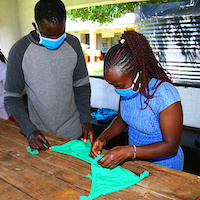Vector-borne diseases: preventable but widespread
You probably know that malaria and other vector-borne diseases are still a major threat to the health of much of the world’s population. You may be unaware, however that malaria, which, caused an estimated 627,000 deaths in 2012, is, like many such diseases, preventable. Nor is malaria the most widespread of vector-borne diseases. The honour — if that is the word — goes to schistosomiasis, transmitted by water snails, and the most widespread of all such diseases, affecting almost 240 million people worldwide. It’s not necessarily fatal but can cause anaemia and a reduced ability to learn. In fact more than half the world’s population is at risk from diseases such as malaria, dengue, leishmaniasis, Lyme disease, schistosomiasis and yellow fever, carried by mosquitoes, flies, ticks, water snails and other vectors. Every year more than one billion people are infected and more than one million die from vector-borne diseases. It’s not — or not entirely — a lack of effort that is the reason these diseases are not kept in check. People are moving, travelling, growing in number and establishing new, sometimes unplanned, towns and cities where the poorest and most malnourished populations, living in areas with bad or inadequate sanitation, are at most risk. Nevertheless, much more could be done at national and international level to prevent such diseases, which makes the World Health Organisation (WHO) call for a global health agenda that gives higher priority to vector control more important than ever. The newly published WHO document ‘A global brief on vector-borne diseases’ gives powerful backing for this call. It outlines steps that governments, community groups and families can all take to protect people from infection. As does the WHO’s World Health Day whose theme this year is preventing vector-borne diseases or, as the accompanying slogan memorably puts it: ‘Small bite, big threat’. World Health Day officially took place on Monday but the message it sends is still important now and will be for some time to come: vector-borne diseases are a serious and increasing threat — and they are entirely preventable. Have a look at http://www.who.int/campaigns/world-health-day/2014/en/, where you can find more details about World Health Day and simple ways to avoid contracting such diseases. But please don't stop there. The whole WHO site is a valuable and interesting source of information on a number of health issues (most notably through the health topics A-Z). And of course, we at Friends of Londiani will try to keep you — and everyone we work for and with — informed on these and other health issues. Health and hygiene are major and continuing focuses of FOL’s work, and information is one of the most important tools we have.

